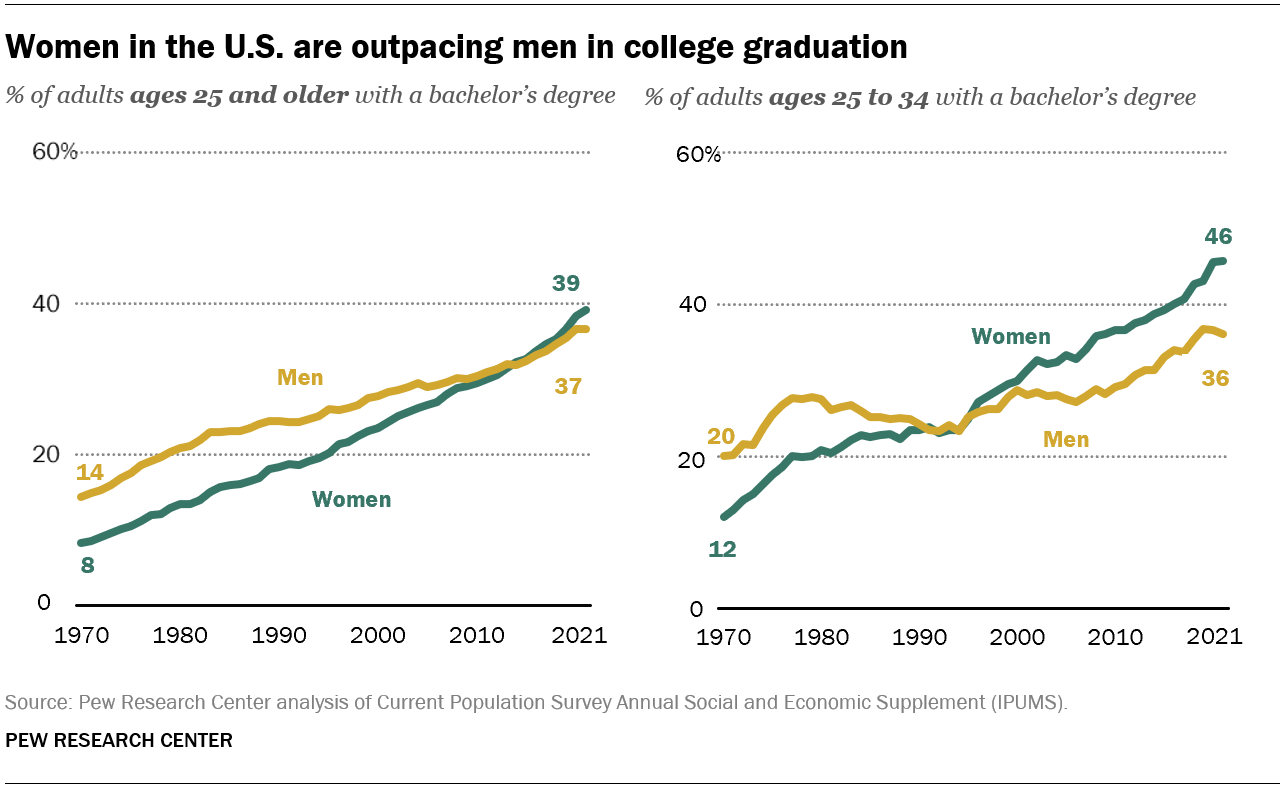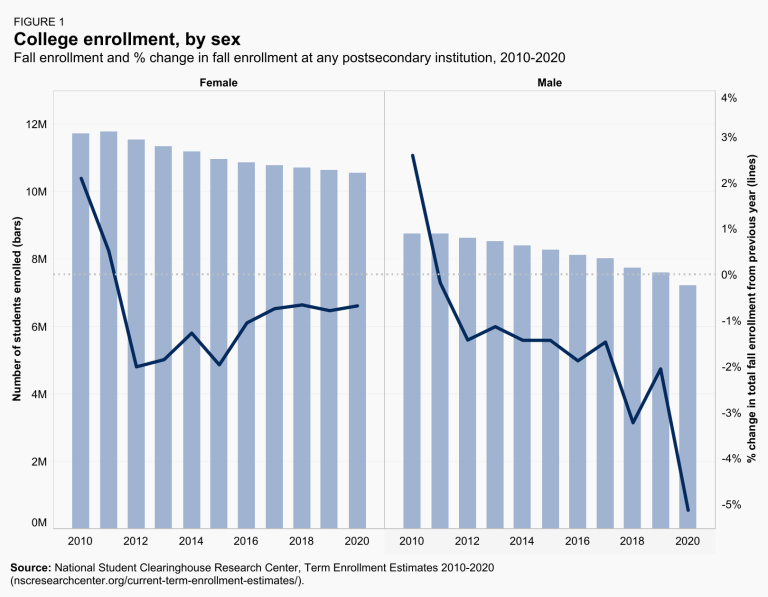Taking the mental health of boys seriously
Declining graduation rates, decreasing sperm counts and testosterone levels, and fewer close friendships. Exploring the irrefutable evidence that men and boys are struggling in unprecedented ways.
The value of friendship is not talked about enough. Having friends is protective for your health, with some researchers even suggesting that prolonged social isolation and having no close friends is the equivalent of smoking 15 cigarettes a day. We need close relationships outside of our family and intimate relationships in order to be well. Being sad, lonely, and without friends is a painful experience and is having such noticeable impacts on our collective wellbeing that scholars are giving it a name. We are in a friendship recession.
The friendship recession is impacting men most drastically. In 2021, 15% of men said they have no close friendships. This is a fivefold increase from 1990, where only 3% of men said they had no close friends. That’s not the only concerning male friendship statistic— the percentage of men with at least six close friends fell by half, from 55% in 1990 to 27% in 2021. This paints a concerning picture about the state of men’s friendships, and might predict an even more worrisome trend for the boys and men of the future if it gets worse.
With changes in technology, differences in the way we work, and geographic dispersion, our lives have become less intertwined. This results in a process of atomization, which makes us operate in silos and causes social separation. When it comes to friendships, men and boys are more prone to atomization and have been culturally conditioned to shove away their true feelings and adopt a lone wolf mentality. Essayist Willow Liana talks about how she sees us all struggling to cope with the complexity of atomization:
“I see people grappling with this problem in many ways: from attempts to return to older traditions, to new solutions which are more compatible with the modern world; from turning inward to fix themselves, to turning outwards to fix the world.” A quote from All the Lonely People: The Atomized Generation (Liana, 2020).
In my work, I see boys and men struggling with this often. I see us all struggling to make sense of how atomization impacts our social lives, our wellbeing, and even our identity and sense of purpose. When we can’t make sense of our surroundings, we might go inward to make sense of why we feel the way we do. Atomization might be causing us to blame ourselves or blame each other for the state of social stress we’re experiencing collectively.
Boys at school
In school, boys are struggling academically and are not pursuing post-secondary education at the same rates as girls. When it comes to education, boys need the most help. Some have even made calls for us to “redshirt the boys” and have boys start school a year later than girls to make up for the gender differences in how we’re socialized, how we experience puberty, and our readiness to learn. Richard Reeves notes that “once boys start school, they almost immediately start falling behind the girls.” Many have noted that a delayed start to kindergarten might set boys up for success at an early point in life. An interesting proposition.
In terms of post-secondary education, boys are no longer pursuing post-secondary education at the same rate as girls. For every six women, colleges in the U.S. enrol roughly 4 men and there has been an overall drop in enrolment, largely due to the decrease in the amount of men who apply and enroll.
Of the men who start a post-secondary degree but do not finish it, a third of the men say it is because they “just don’t want to.” The concern I’m noting as a therapist who supports young men is not just with respect to admission, but completion. Boys are not completing their degrees at concerning rates and this is true of both high school and post-secondary school degrees. In terms of equitable treatment, it is said that the education system biases boys (whereas the workplace biases women). Though it can be said that the workplace biases all women, I do wonder if the education system biases all boys. If it does not bias all boys, then I wonder what boys experience this bias?
I have a few guesses as to what “type” of boy might encounter this bias in education (maybe that’s another post). But, we do know that boys are more likely to be diagnosed with ADHD or a learning disability, and I do wonder whether or not our education systems are set up to fully support the diverse learning needs of boys in general. We can teach boys organization, emotion regulation, and executive functioning skills all we want in order to resolve these gaps but until we recognize how the systems and structures of education are disadvantaging boys, I don’t think we will see any change.
Declining fertility
Another concerning trend I’m watching as it relates to boys and men is the significantly noticeable decline in worldwide sperm counts and testosterone levels. There is data to suggest that men are becoming increasingly infertile and the consumption of plastic might be largely to blame, according to Dr. Shanna Swan. She notes that sperm counts have declined roughly 50 percent in 50 years.

Dr. Swan, in her book Count Down, discusses how our modern environment is changing and reshaping us. When it comes to boys, she notes a most concerning hypothesis: By 2045, sperm counts in men are headed toward zero, leaving the human race in peril. Yikes.
I wonder how this will impact men, non-binary individuals, and the people who partner and raise families with them, particularly with respect to the mental health aspect of increasing infertility. This will undoubtedly put more stress on families in the future.
Note: The next section discusses suicide and suicide attempts. If you are not in a place to read about this topic, you can continue reading after the next photo.
Taking men’s mental health seriously
You may have also heard the statistic that men are more likely to die by suicide. Since men are more likely than women to die in this manner, it is easy to conclude that men’s mental health should be taken most seriously. Yes, we need to take men’s mental health seriously. And there is a paradox here we often do not talk about: men are more likely to die by suicide but women are more likely to attempt it.
While men are more likely to die by suicide, it is also true that women and girls have higher rates of mental health issues and women and girls attempt suicide more than men and boys. Men are statistically more likely to die when they attempt suicide because they choose more violent and more lethal means. This is not because men’s mental health conditions are more common than women’s or because men suffer the most. It raises the question: why do men choose more violent or more lethal means?
Where are the boys?
Looking at all these statistics, it is clear that men and women simply experience these issues differently. Men and women suffer differently, not more or less than the other. Let’s also not forget there are differences within genders, rather than just between them. Not to mention, we still do not have enough granular data on trans and non-binary people to draw conclusions about their experiences with friendship, education, fertility, and suicide.
A question I ask myself frequently in my profession is, “where are the boys?” If they’re not graduating, getting jobs, getting partners, or finding friends at the same rates, then where are they? I fear the answer is a lot more bleak than we’d like to admit. We are losing boys to the atomized lifestyle; solo, siloed, silent, and separated. We are losing boys to the things that give them the most amount of dopamine for the least amount of effort, which are video games, gambling apps, YouTube videos, chat forums, pornography, alcohol, tobacco, and marijuana.
What’s the solution?
Given these statistics, I suggest we need to take the mental health of boys and men more seriously than we are. It appears they may face unprecedented levels of loneliness, joblessness, and infertility in the coming future, so it is ever-important for men to build their emotional toolbox, get connected with supports, and lean on those around them. Boys and men often struggle in silence and face an uphill battle when it comes to being vulnerable, opening up, and subverting masculine norms. As men, it is time we reclaim and redefine masculinity so it can work in our favour rather than against us.
I really do think awareness is a major part of the solution. When we acknowledge and validate that boy’s and men’s mental health is worth taking seriously, we can start talking about how we’re struggling and what we need to feel fully supported. As men, we’ve been socialized to be strong, but many of us didn’t learn how to ask for help, how to admit when we’re struggling, and how to show up for ourselves and others.
That, in my opinion, is true strength.
Jake
P.S. I want to thank all of you who have supported my longer-form writing. I appreciate those who have subscribed and those who have made a financial contribution through purchasing the paid subscription option. It helps support my mission of bringing this important work outside of the therapy room. If you’d like to support my work (your way of “buying me a coffee”), click here.









Very eye opening and concerning. Mother of 2 grown sons. Thank you for your attention to issues of boys/men